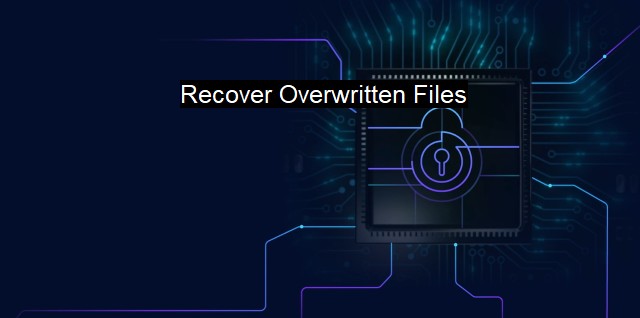What are Recover Overwritten Files?
Recovering Overwritten Files: A Crucial Step in Enhancing Cybersecurity and Antivirus Measures to Prevent Data Loss and Breaches
Recover Overwritten Files commonly refers to the act of reclaiming original versions of digital files that have been accidentally or maliciously manipulated or replaced. This phenomenon is particularly significant within the context of cybersecurity and antivirus because it can indicate a breach of secure systems or be the result of virus or malware infection.On personal computers or business networks, files can often be written over or changed without a user's conscious action. This can happen from ordinary activities such as software updates, file transfers, or even browsing the internet but can also occur when a device is attacked by malware that specifically targets file data.
The process of overwriting a file essentially means that the original content of the file is deleted, and new data deletes its space on the hard drive. When a malicious user or program overwrites a file, the original content is generally not retrievable using simple software recovery tools. For most daily computer users, an overwritten file may appear to be permanently beyond reach.
In the cyber domain, things are not so simple. Though it might seem like an overwritten file is permanently lost, in some instances, recovery of an overwritten file is indeed possible with the help of some specialized tools or techniques. Experts in the field of digital forensics and cybersecurity have developed methods that can partially or entirely recover the content that has been overwritten.
The overwritten data restoration process depends on various factors. Amongst them, the most influential are the file system type utilized and how many times the data has been overwritten. A general notion in the field is that the more a file is overwritten, the tougher it becomes to recover the original data.
In the arsenal of recovery tools, antivirus software is an essential asset. Despite the mainstream comprehension that antivirus software solely protects against malware attacks, the modern variants serve the twin purpose of protection via preventing attacks and aiding data recovery post any data breach.
Data recovery options in antivirus software generally function by retrieving 'shadow copies' of files from the 'System Restore' option found in modern Operating Systems. Whenever modifications are made to a file, like overwriting, a shadow copy preserves the previous version of the file, thereby offering an avenue for data restoration.
In conjunction with antivirus software, there are multiple standalone software programs that specifically aim at data retrieval. These data recover tools employ complex algorithms scanning hard disk sectors byte by byte for potential data remnants, eventually retrieving as much deleted, reformatted, or overwritten data as possible.
Robust prevention measures against data loss remain crucial; these include maintaining updated antivirus applications, regular system backups, and layer-by-layer encryption of sensitive data. Overwriting specific sensitive files beyond recovery, usually known as secure erase or shredding, is a recommended practice for carrying out a thorough purge of potentially destructive information.
Recover overwritten files denote an integral feature in contemporary digital life, playing a pivotal role in maintaining and safeguarding cyber ecosystems. It brings together an array of tools, sophisticated mechanisms, and expert knowledge, providing a powerful cover amid constantly emerging security threats. Every overwritten file carries with it a tale of discrete digital faith; recovery, on the contrary, unfolds an equally incredible chronicle of persistence, fortitude, and evolution in the world of cybersecurity.

Recover Overwritten Files FAQs
What does it mean to recover overwritten files?
Recovering overwritten files means restoring data that has been overwritten by new data on a storage device. This can happen when a file is accidentally deleted or when it is replaced by a newer version of the same file.Is it possible to recover overwritten files?
Yes, it is possible to recover overwritten files, but it depends on how the data was overwritten and how quickly you act to try to recover the data. If a file has been overwritten by new data, it may not be possible to recover the original file.What steps can I take to recover overwritten files?
To recover overwritten files, you first need to stop using the storage device to prevent further overwriting of the data. Then, you can use specialized data recovery software or services to scan the storage device for recoverable data. It is important to note that there is no guarantee that all overwritten files can be recovered.How can I prevent my files from being overwritten?
To prevent your files from being overwritten, you should regularly back up your important data to an external storage device or cloud-based storage service. You can also use file versioning features in some software applications to keep track of different versions of a file. It is also important to be careful when deleting or modifying files and to regularly update your antivirus software to prevent malware attacks that could overwrite your data.| | A | | | B | | | C | | | D | | | E | | | F | | | G | | | H | | | I | | | J | | | K | | | L | | | M | |
| | N | | | O | | | P | | | Q | | | R | | | S | | | T | | | U | | | V | | | W | | | X | | | Y | | | Z | |
| | 1 | | | 2 | | | 3 | | | 4 | | | 7 | | | 8 | | |||||||